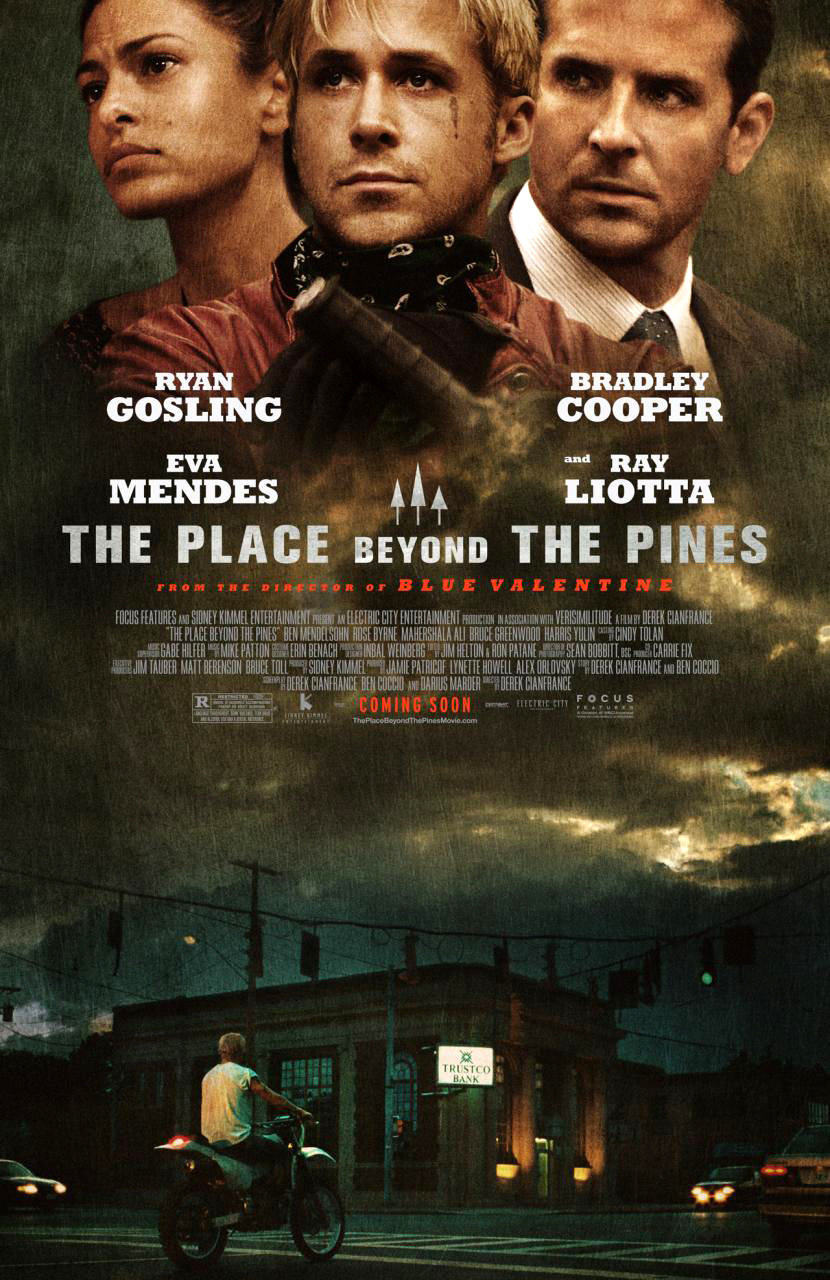Outstandingly lacking humility, it's a cocky film, seemingly sure in its ability to capture the expanse of time and consequences through a revolving door of visual and auditory motifs, not to mention Cianfrance's insistance on single takes. Essentially, the first forty-five minutes to an hour--somewhere in there-- are cinematic majesty, virtually achieving everything anyone on this project hoped to accomplish. Surprising tenderness is juxtaposed with the art-house equivalent to high-octane chase sequences, and along with the robberies seen in the trailers, they continually kick you in the gut. At times, this can produce an overwhelming effect in a rich and highly involving manner, enhanced all the more by a catalogue of creative cinematography, from the carnival lights to the dizzying camera following Luke in a forest full of pines. Gosling is magnetic, offering what may have been his best performance to date, or at least amongst the very best- he's an emotional powerhouse through a multitude of acting subtleties, and had this film been released closer to bullshit statue time, he may have had a serious shot at a win.
Unfortunately, the sinister whimsy dominating the tone, characters, and more or less, life, in this opening act quickly dissipates in exchange for a routine plot template in countless films and tv shows, but to be fair, Cianfrance tells these stories with rare lyricism and thematic density, articulated beautifully in a speech given some ways through by Bradley Cooper- who's also fantastic. Especially memorable is a dinner scene with emerging anxiety from each of the characters-- none can truly claim complacence. But, for me, the artistry present in every turn of the first act is rare to be seen throughout the second act or even third act, returning (admittedly rather spectacularly) in the final fifteen or twenty minutes. The cinematography becomes a dour affair, and not even the grace written and directed into these scenes can always elevate it beyond conventionality. Without talking much about it at all, this is most evident in the final act of the film, where key new characters are merely finely executed stock archetypes witnessed constantly in a few different genres, and for those that know where the film is headed can infer which I mean. Worse still, the film isn't even rushed in the sense several scenes feel written into one, but instead feel as though an index of importnat scenes were omitted completely. Without being too specific, it becomes a challenge to constantly stay at the emotional high the film clearly thinks it deserves. In large part, this is due to the radical changes in plot and character motivation that happen unnervingly frequently- it's not that these actions aren't believable, they are, it's that the film never breathes long enough to let our spongey hearts fully absorb the drama before moving on to another plate of tragic storytelling.
I'm confident some of this reaction was deliberate, specifically that the poetry and power felt in the first act was meant to echo throughout the remaining minutes, especially because it establishes the many motifs used sporadically throughout. It's just that the film never stops sprinting to greatness, but constantly using the first act to drive the key emotional moments throughout obstructs Pines from ever running past the first act's shadow. Running and running, it seems to always get out of breath just as it has you convinced it just might cross that shadowy threshold. It doesn't. Ultimately, it fails as an attempt to emulate Shakespeare and Greek Tragedy in equal measure, and not a second passes without it being exceedingly (and distractingly) obvious that Cianfrance thinks he's made a masterpiece. The thing is, if the artistry and attack on the ordinary that perseveres through the first act continued, he may just have. As it stands, The Place Beyond the Pines is deeply flawed but harrowing and haunting plunge into the poisoned legacies of our fathers. It is never less than a beautiful and stirring piece of cinema that's chased me ever since the credits rolled, and although that doesn't make it a masterpiece, it is an ardent declaration of the film's transcendent power.


